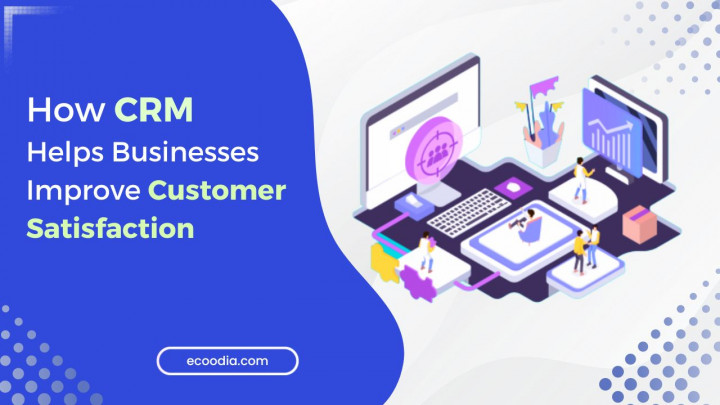How CRM Helps Businesses Improve Customer Satisfaction

The methods, strategies, and technologies that companies use to manage and analyze customer interactions and data throughout the customer lifecycle are collectively known as customer relationship management (CRM). The aim is to increase customer interaction to promote customer loyalty and increase sales. CRM systems collect customer information from a variety of customer-business interactions, such as those that occur over the phone, live chat, email, direct mail, social media, and channels like a business website. A CRM system can also provide employees interacting with customers with detailed information about their personal data, purchase history, preferences and interests.
- What CRM System Does?
- Why CRM Benefits Businesses.
- How Does CRM Works?
- How a CRM system can help your business today.
- CRM Effects on Customer Satisfaction.
- Customer Benefits Using CRM.
What CRM System Does?
Any customer information system, including CRM software, revolves around contact management. The main function of CRM is to manage and store all data for all types of contacts, from leads to business partners.
Why CRM Benefits Businesses
Both large and small businesses can benefit from using a CRM system by. Customer support agents can easily provide better and faster customer service if customer information such as past purchase history and interaction history are available. Companies can use visualization and reporting tools to identify trends and gain insights about their customers by collecting and gaining access to customer data. Automated customer service and common but important sales funnel tasks.
How Does CRM Works?
A CRM system typically includes a customer database, data management tools to manage various customer data, workflow automation features for process design and management, analytics, tables and additional features such as forecasting and smart scoring. Using these features, businesses can interact with their customers through a variety of channels, including websites, emails, phone calls, chatbots, and others. Widely considered the answer to sales, marketing, and other customer contact teams. CRM software dramatically streamlines day-to-day work by automating a wide range of related tasks. related to sales channel management and marketing tools, reporting, forecasting, analytics, etc.
Customer service teams can use enhanced CRM to gain full visibility into customer profile data, streamline customer request management, and automate service operations. service and continuously optimize workflows to serve customers with excellence. The most effective CRM systems include the ability to track customer behavior to track customer interactions across all channels. For example, interactions can be tracked through e-commerce carts, banner ads, buttons, and other interactive elements on the website. Smart CRM systems can analyze customer behavioral data to improve customer profiles and use AI to recommend the most relevant next best offer or the next best course of action for the customers. customer interaction group.
CRM systems facilitate greater operational efficiency. The automates repetitive tasks and simplifies team performance reviews for managers. For example, CRM provides productivity tools like project and task management with the ability to automate repetitive tasks and create business rules. To continuously improve customer engagement strategies and increase conversion rates, some CRMs also offer powerful analytics capabilities that allow users to track the effectiveness of customer engagement strategies difference.
Read More : Top 10 PPC Company in Ahmedabad
How a CRM system can help your business today
1. Changes to Your Subtitle Line
Implement a proven CRM platform to deliver real results, including increased profits. CRM requirements have a growing history.
2. Classification and Definition of the Above.
A CRM system can allow you to easily and quickly find new leads, add and categorize them correctly. Sales can prioritize closing opportunities by focusing on the right leads, and marketing can identify leads that need extra attention and position them to Become a quality lead. Sales and marketing can focus their efforts on the right customers using complete, accurate, and focused customer and prospect information.
3. Current Customers Recommendation Number Need to be Increase.
Understanding your customers better makes cross-selling and up-selling opportunities clear, making it possible to win new business from existing customers. Better visibility will allow you to provide your customers with a more satisfied service. According to some studies, returning customers are 33% more likely to spend more money, up to 33%, because they are satisfied customers.
Read More : Mobile Web Development Company in Indore 2023
4. It has Better Customer Support
Today's customers expect fast, personalized support day or night. You can provide your customers with the high-quality service they want with the help of a CRM system. To quickly give customers the answers they need, your agents can easily view the products they have ordered from customers and get a record of every interaction. Customer service, marketing, and other aspects of your business can all benefit from a CRM.
5. Improve Goods and Services.
A good CRM system will collect data from a variety of sources both inside and outside your business. This gives you unprecedented insight into how your customers feel and what they say about your business, allowing you to improve your service, identify market gaps, and avoid problems in advance. when they become serious.
CRM Effects on Customer Satisfaction
Because it has the potential to boost consumer loyalty and usage while reducing customer complaints and risk of churn, customer satisfaction has significant economic implications for businesses. Customer knowledge and satisfaction can be affected by the implementation of a CRM strategy for a number of reasons. At first, companies could tailor their products to each customer. CRM applications allow businesses to tailor their services to each customer's unique preferences by collecting data from all customer interactions and processing that data to find hidden patterns.
Since customers' perception of the quality of goods and services is a determining factor in customer satisfaction, CRM applications have an indirect impact on customer satisfaction. CRM software also allows businesses to process customer orders and inquiries quickly and accurately, as well as maintain account management for existing customers.
Read More : Which Of The Following will you Need to Start an Email Marketing Programme
Customer Benefits Using CRM
Customers experience better day-to-day service by using a customer relationship management system. With more reliable information, they will be less interested in self-service companies. Customer satisfaction increases if interaction with the company on various issues becomes less necessary. All three types of equity relationship, value and brand image and ultimately customer equity would hypothetically be linked to these core benefits of CRM.
Eight benefits have been identified as value creation factors.
- Improves the ability to identify profitable customers.
- Support integration on all channels.
- The effectiveness and efficiency of the sales force has increased.
- Price improvement.
- Personalized goods and services.
- More effective and efficient in providing customer service. Campaign
- Is another name for personalized marketing messages.
- Connect customers and all channels into one platform.
Read More : What is Chat GPT & How To Use Chat GPT to Make Money Real World
